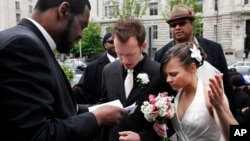As time goes by, Americans have broadened their idea of what constitutes marriage. But one area where we've gone the opposite direction: marrying out of the family's political party.
The Gallup organization has been charting American attitudes about marriage for years. In 1958, for instance, they noted that only 4 percent of Americans approved of an interracial marriage between blacks and whites. These days, that number is 87 percent.
And just 20 years ago, a majority of Americans disapproved of the idea of marriage between people of the same sex. Today, 61 percent of people support same-sex marriage.
Lynn Vavreck, a political science professor at the University of California-Los Angeles, decided to see how people would feel if their kids decided to marry outside their political party.
“The Gallup Organization asked a random sample of Americans a question about what kind of man people wanted their daughters to marry,” Vavreck writes in a recent emailed column. “A Democrat or a Republican. The question read: If you had a daughter of marriageable age, would you prefer she marry a Democrat or a Republican, all other things being equal?”
When Gallup surveyors posed that question in 1958, 18 percent said they would want their daughter to marry a Democrat and 10 percent a Republican, while an overwhelming 72 percent said they wouldn't care.
And now?
So, Vavreck decided to ask what she called a “representative sample of people a version of this question,” which included the words "son" as well as "daughter."
The answers she got were surprising: “Twenty-eight percent of respondents said they wanted their son or daughter to marry a Democrat and 27 percent a Republican, leaving only 45 percent to say they didn't care.”
When it comes to Americans who identify strongly as Democrat or Republican, the divide is even wider. In 1958, “33 percent of Democrats wanted their daughters to marry a Democrat, and 25 percent of Republicans wanted their daughters to marry a Republican,” Vavreck writes. “But by 2016, 60 percent of Democrats and 63 percent of Republicans felt that way.”
It points to the idea that Americans are increasingly living among like-minded people, in their own “ideological bubble,” as it's been called. This trend now applies to romance.
So don't be surprised if you hear someone say, “No child of mine will marry a Democrat!” Or a Republican, depending on party affiliation.
Political gridlock, it seems, has moved out of the voting booth and into the wedding chapel.





